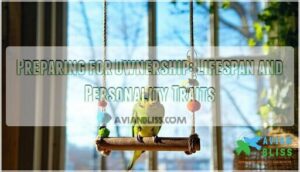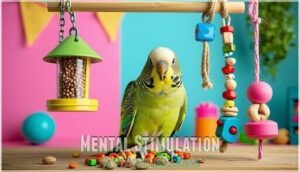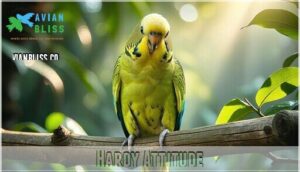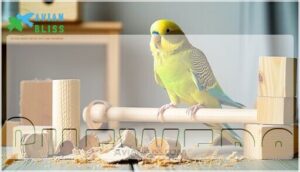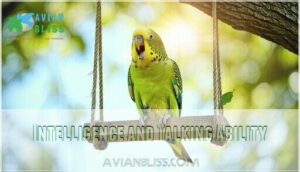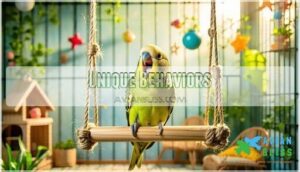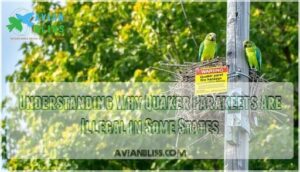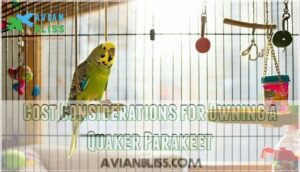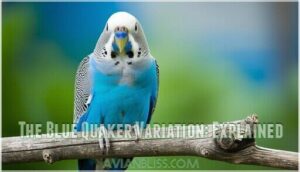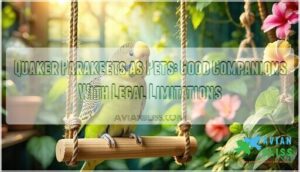This site is supported by our readers. We may earn a commission, at no cost to you, if you purchase through links.
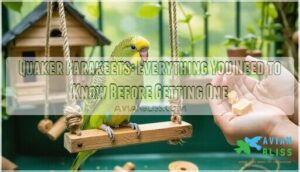
These intelligent birds live 20-30 years, requiring daily social interaction, mental stimulation, and specialized diets.
They’re notorious chewers with loud vocalizations and territorial tendencies that demand experienced handling.
While their talking ability and engaging personalities make them appealing companions, their long-term commitment and complex care needs aren’t suitable for every household.
Understanding their unique behavioral patterns and environmental requirements will determine whether you’re ready for this decades-long partnership.
Table Of Contents
- Key Takeaways
- Legal Considerations for Owning a Quaker Parakeet
- Preparing for Ownership: Lifespan and Personality Traits
- Care and Maintenance of Quaker Parakeets
- Characteristics of Quaker Parakeets
- Understanding Why Quaker Parakeets Are Illegal in Some States
- Compatibility of Quaker Parakeets With Other Birds
- Cost Considerations for Owning a Quaker Parakeet
- The Blue Quaker Variation: Explained
- Quaker Parakeets as Pets: Good Companions With Legal Limitations
- Frequently Asked Questions (FAQs)
- What to know about parakeets before getting one?
- What to know before getting a Quaker parrot?
- What do I need to know before buying a parakeet?
- What should you do when you first get a parakeet?
- Can Quaker Parakeets be trained to do tricks?
- What is the lifespan of a Quaker Parakeet?
- Are Quaker Parakeets noisy birds?
- Can Quaker Parakeets live in outdoor aviaries?
- Do quaker parakeets get along with children?
- How much do quaker parakeets typically cost?
- Conclusion
Key Takeaways
- Check legal restrictions first – You cannot own Quaker parakeets in ten states, including California and Pennsylvania, and getting caught means confiscation and euthanasia of your bird.
- Prepare for a 20-30 year commitment – These are not starter pets; they will need daily interaction, specialized veterinary care, and consistent attention throughout their surprisingly long lifespan.
- Budget for ongoing expenses – You will spend $130-$200 monthly on food, toys, and care, plus initial setup costs of $600-$1,000 for the bird and proper housing.
- Understand their demanding nature – They are loud, destructive chewers who need mental stimulation and can become territorial or aggressive without proper socialization and daily engagement.
Legal Considerations for Owning a Quaker Parakeet
Before bringing home a Quaker parakeet, you’ll need to check if they’re legal in your state since ten states ban ownership due to invasive species concerns.
If you’re caught with an illegal Quaker, authorities may confiscate and euthanize your bird, making this research your most critical first step.
State Legality and Consequences
Several states ban Quaker parakeets due to their invasive species status, creating serious ownership risks.
California, Connecticut, Georgia, Hawaii, Kentucky, Maine, Pennsylvania, Rhode Island, Tennessee, Wisconsin, and Wyoming prohibit ownership entirely.
Legal ramifications include confiscation, euthanasia policies for seized birds, and fines exceeding $10,000 under federal law.
Bird state law compliance is essential—illegal possession prevents veterinary care and triggers enforcement action. Owners should research the quaker parrot laws to understand local regulations.
Lifespan and Commitment
When considering a quaker parakeet lifespan, you’re looking at a substantial lifespan commitment of 20-30 years.
This longterm commitment requires careful planning for responsible ownership throughout your bird’s life expectancy.
- Life Expectancy Planning – Budget for decades of veterinary care, housing, and daily maintenance costs
- Long Term Care Preparation – Consider your living situation changes, career moves, and family planning over 20-30 years
- Owner Commitment Requirements – Daily interaction, bird socialization, and mental stimulation needs remain constant throughout their parrot lifespan
- Succession Planning – Arrange care provisions in case you can’t fulfill the complete bird lifespan commitment
It’s vital to research invasive species laws to verify you understand the regulations surrounding quaker parakeet ownership.
Cage and Diet Requirements
Your quaker parakeet care requires a minimum cage size of 24 x 24 x 24 inches with zinc-free bars and 5/8-inch spacing. Bird cage requirements include secure latches and easy-clean placement.
Quaker parrot diet needs high-quality pellets (60-70%), fresh vegetables, and limited seeds. Bird nutrition advice emphasizes daily water quality changes and food variety rotation.
Bird cage setup should include chewable toys with regular toy rotation for mental stimulation, ensuring a varied and engaging environment with easy-clean placement.
Preparing for Ownership: Lifespan and Personality Traits
Before committing to ownership, you’ll want to understand what makes these birds tick.
Quaker parakeet personality traits include strong intelligence, vocal abilities, and an independent streak that’s both charming and challenging.
Their parakeet behavior centers around forming deep bonds with primary caregivers while potentially showing territorial tendencies toward strangers.
The quaker parrot lifespan spans 20-30 years, making this a serious lifespan commitment that may outlast other pets.
This longevity means your bird ownership considerations must include decades of consistent care, veterinary expenses, and daily interaction.
Socialization needs are non-negotiable, and these birds thrive on routine social engagement.
They can develop aggressive behavioral patterns if neglected.
Proper quaker parakeet care involves daily out-of-cage time, mental stimulation, and consistent training from day one.
Your ownership responsibilities extend beyond basic needs.
Without adequate attention, Quakers may resort to destructive behaviors like feather plucking or excessive screaming.
Think of them as feathered toddlers who never quite grow up – they’ll demand your attention for decades to come.
Understanding the factors affecting bird lifespan genetics is essential for providing the best possible care for your Quaker parakeet.
Care and Maintenance of Quaker Parakeets
Once you’ve chosen your Quaker parakeet, you’ll need to establish proper care routines that support their health and happiness.
Your bird’s daily needs include spacious housing, balanced nutrition, and mental enrichment to prevent behavioral issues.
Cage Considerations
Your feathered friend needs a spacious home with proper cage size requirements.
Choose a minimum 24x24x24-inch bird cage with 5/8-inch bar spacing to prevent escape. Zinc-free cage bars guarantee cage safety.
Include varied perches at different heights for foot health. Select sturdy toys that withstand their chewing habits.
Secure latches prevent clever escape attempts from these intelligent birds. When selecting a cage, consider large bird cages to guarantee your Quaker Parakeet has enough space to fly and exercise, ensuring their overall well-being and providing a healthy environment.
Dietary Needs
A proper bird diet starts with high-quality pellets forming 60-80% of daily intake, providing balanced nutrition that prevents bird fatty liver disease.
Fresh foods like leafy greens and colorful vegetables supply vitamins, while healthy snacks should stay under 10%.
Nutrient supplements aren’t typically needed with quality pellet options and varied fresh foods. A well-planned balanced diet approach is essential for the overall health of Quaker Parakeets, following a balanced diet.
Fresh Food and Water Daily
Beyond basic nutrition lies the art of daily freshness. Your Quaker’s vitality depends on consistent hydration and varied nutrition that keeps their system thriving.
- Fresh Fruits – Rotate seasonal options like apples, berries, and leafy greens for ideal nutrient balance
- Food Variety – Mix pellets with vegetables and occasional hard-cooked eggs for thorough bird nutrition
- Calcium Sources – Provide cuttlebone or mineral blocks supporting strong beak development and overall bird health
- Daily Hydration – Replace water every 24 hours, cleaning dishes to maintain water quality
- Monitor Consumption – Remove uneaten produce within 4 hours to prevent bacterial growth affecting parakeet health issues
Mental Stimulation
Without proper mental stimulation, your Quaker Parakeet can develop destructive behaviors like feather plucking and aggression.
Provide behavioral toys, rotate puzzle feeders weekly, and schedule daily playtime activities.
Social interaction through training exercises keeps their sharp minds engaged.
Environmental enrichment with foraging opportunities satisfies natural instincts while preventing boredom-related issues.
Characteristics of Quaker Parakeets
Understanding these parakeets’ distinct characteristics helps you determine if they’re compatible with your lifestyle and expectations.
Their unique personality traits and behaviors substantially influence daily care requirements and long-term ownership success, making daily care a crucial aspect to consider.
Hardy Attitude
Quaker parakeets display remarkable fearless nature that sets them apart from timid birds.
Their confident behavior stems from adaptive traits developed over generations.
These hardy birds form strong social bonds while maintaining their independent spirit.
You’ll notice their vocal abilities complement their bold personality perfectly.
Here’s what makes their hardy attitude special:
- Environmental resilience – They adapt to temperature changes from 40-90°F
- Social confidence – They approach new situations without hesitation
- Territorial defense – They protect their space with determined vigor
- Problem-solving skills – They tackle challenges head-on rather than retreating
This quaker parakeet size personality in a compact 11-12 inch body creates an impressive companion.
Their quaker parrot lifespan of 20-30 years means you’ll witness this hardy attitude mature over decades.
Bird care essentials include respecting their bold nature while providing structure.
Chewers
Your feathered friend’s destructive streak isn’t mischief—it’s instinct.
Quaker parakeets are relentless chewers who’ll tackle everything from cage bars to furniture.
Provide rotating chew toys made from safe woods like apple or willow. Homemade toys using cardboard and untreated wood blocks satisfy their beak care needs while protecting your belongings.
Regular toy destruction signals healthy parakeet exercise needs, and it’s essential to address this by offering a variety of toys to keep them engaged and active, ensuring their overall well-being through proper beak care.
Intelligence and Talking Ability
One remarkable trait sets Quaker Parakeets apart: their exceptional vocal abilities and sharp intelligence.
These feathered companions consistently demonstrate impressive mimicry skills and communication styles that’ll amaze you.
Here’s what makes their talking ability special:
- Master 50+ words – Your Quaker can develop an extensive vocabulary with patience
- Crystal-clear speech – Their voices ring clearer than many parrot species
- Contextual communication – They’ll say "goodbye" when you leave home
- Quick learners – Most begin mimicking within months of dedicated training
Intelligence tests reveal Quaker parrots possess cognitive abilities comparable to five-year-old children.
Their communication skills extend beyond simple mimicking – they reorganize learned words creatively.
With consistent talking tips and practice, you’ll witness their remarkable intelligence quotient firsthand.
Unique Behaviors
Your Quaker’s hardy attitude shines through their distinctive quaking behavior – rhythmic shaking that’s completely normal, not stress-related.
These social birds excel at vocal abilities, mimicking household sounds and developing strong social bonding with their families.
However, boredom triggers territorialism around cages and can lead to destructive feather plucking, making daily interaction essential for balanced social dynamics.
Understanding Why Quaker Parakeets Are Illegal in Some States
Before diving into state laws, understand that quaker parakeets face legal restrictions due to their classification as invasive species in multiple states.
These intelligent birds can establish feral populations when released or escaped, creating significant ecological impact on native ecosystems.
State laws prohibiting quaker parakeets exist in California, Connecticut, Georgia, Hawaii, Kentucky, Maine, Pennsylvania, Rhode Island, Tennessee, and Wyoming.
The legality stems from their ability to outcompete native bird species for resources and nesting sites.
Their large communal nests on utility poles create fire hazards and power outages, adding infrastructure concerns to ecological ones.
Bird legality essentials require checking local regulations before ownership.
Violating these laws results in confiscation and euthanasia of your pet, with no access to veterinary care within prohibited states.
Some states require permits or impose restrictions like wing clipping.
The invasive species designation isn’t just bureaucratic red tape—it’s based on documented cases of crop damage and ecosystem disruption in areas where these adaptable birds have established wild colonies.
Understanding the invasive species risks is vital for responsible pet ownership and conservation efforts.
Compatibility of Quaker Parakeets With Other Birds
The social nature of these colorful companions makes them excellent candidates for multi-bird households, though successful bird socialization requires careful planning and patience.
Quaker Parakeets generally adapt well to mixed species flocks, displaying remarkable flexibility in their avian interactions with cockatoos, cockatiels, and other medium-sized parrots.
Their confident personalities can sometimes clash with more timid species, so monitoring flock dynamics becomes essential during the introduction period.
You’ll want to observe body language, territorial behaviors, and feeding patterns to guarantee harmonious coexistence among your feathered friends.
Key compatibility factors include:
- Size matching – Pair Quakers with similarly sized birds to prevent bullying or accidental injury during play
- Supervised introductions – Allow gradual face-to-face meetings in neutral territory before cage sharing
- Individual personalities – Some Quakers prefer parrot socialization while others thrive in species compatibility situations
Successful integration depends on providing adequate space, multiple feeding stations, and separate retreats when tensions arise.
Remember that communal nests aren’t typical for mixed flocks, so don’t expect immediate bonding between different species.
Cost Considerations for Owning a Quaker Parakeet
Understanding the financial commitment before bringing home a Quaker parakeet helps you budget for their 20-30 year lifespan.
You’ll need to factor in ongoing costs for quality food, veterinary care, and cage maintenance that can add up over time.
Cost of Pellets Vs. Seeds
Beyond compatibility with other birds, you’ll face different costs between pellets and seeds.
Pellets typically cost $16-$22 per 2-pound bag, while seeds range from $6.59-$18. Though pellets seem pricier upfront, they offer better nutrition value and reduce waste, making your feeding budget more efficient long-term.
When considering the nutritional benefits, to achieve the best results, research high-quality parakeet food options.
| Food Type | Cost Range | Monthly Budget |
|---|---|---|
| Pellets | $16-$22/2 lbs | $25-$30 |
| Seeds | $6.59-$18/2 lbs | $10-$20 |
| Premium Options | Up to $65/5 lbs | $30-$40 |
Nutritional Diversity and Supplementation
Creating diverse pellet diets with fresh fruits and vegetables prevents nutritional deficiencies while reducing long-term veterinary costs.
Quality seed alternatives and vitamin supplements address specific calcium needs, though whole foods remain superior.
Smart bird nutrition essentials include rotating produce weekly for ideal bird diet diversity, which supports regular bird health monitoring to identify supplementation requirements.
This monitoring helps identify supplementation requirements before expensive health issues develop, emphasizing the importance of bird diet diversity.
Hydration and Water Maintenance
Fresh water isn’t optional—it’s your Quaker’s lifeline.
Clean water dishes daily to prevent bacterial growth that threatens bird health concerns.
Monitor hydration levels closely since dehydration develops rapidly in small birds.
Maintain proper humidity levels around 50-60% for ideal respiratory function.
Quality water maintenance directly supports nutritional diversity by helping process supplementation effectively.
The Blue Quaker Variation: Explained
Blue Quaker Parakeets showcase stunning plumage variations through a recessive blue mutation that transforms traditional green feathers into vibrant cobalt hues.
This color genetics breakthrough requires both parents to carry the gene, making these birds relatively rare. You’ll notice their distinctive feather patterns feature brilliant blue backs and wings contrasting with gray breasts and foreheads.
Beak colors remain unchanged from standard Quakers. Understanding parakeet breeding tips helps explain why Blue Quakers command higher prices than typical green varieties.
These bird color variations don’t affect temperament or health, making them equally capable companions as their green counterparts. To provide the best care, making certain that you follow the proper parakeet care guidelines for these beautiful birds is vital for their well-being, ensuring they receive the best environment possible.
Quaker Parakeets as Pets: Good Companions With Legal Limitations
Quaker Parakeets make wonderful companions when you understand their unique needs and Bird Socialization requirements.
These intelligent birds excel at Quaker Behavior like mimicking speech and forming strong bonds with owners.
However, bird legality varies substantially—they’re banned in ten states due to invasive species concerns.
Before considering pet bird costs and bird ownership responsibilities, verify local laws to avoid legal consequences.
Proper Pet Care Tips include providing mental stimulation, managing Feather Management needs, and understanding parakeet breeding tips.
Their 20-30 year lifespan means long-term commitment to Avian Health monitoring and daily interaction.
Frequently Asked Questions (FAQs)
What to know about parakeets before getting one?
Surprisingly, you’ll face strict legal restrictions first—ten states ban Quaker parakeets entirely due to invasive species concerns.
These intelligent, vocal birds need spacious cages, specialized diets, and decades-long commitment for peak health.
What to know before getting a Quaker parrot?
Before committing to a Quaker parrot, you’ll need to verify they’re legal in your state—they’re banned in ten states including California and Pennsylvania.
These intelligent, vocal birds require 20-30 years of commitment, spacious housing, and specialized avian veterinary care to thrive.
What do I need to know before buying a parakeet?
Consider your living situation carefully – parakeets need daily interaction, spacious cages, and specialized diets. They’re loud, live 10-15 years, and require avian veterinary care. Research local laws first.
What should you do when you first get a parakeet?
Congratulations on your feathered friend acquisition! You’ve officially become a full-time bird butler.
Set up a quiet quarantine area away from household chaos, schedule an immediate avian vet checkup.
Let your new parakeet decompress for several days before handling attempts.
Can Quaker Parakeets be trained to do tricks?
Yes, Quaker Parakeets can absolutely be trained to do tricks.
These intelligent birds excel at learning commands like "step up," turning around, retrieving objects, and even playing simple games.
Their high intelligence and willingness to please make trick training both fun and rewarding.
What is the lifespan of a Quaker Parakeet?
Looking for a long-term feathered friend?
Quaker parakeets typically live 20-30 years with proper care, making them a significant commitment.
You’ll need consistent veterinary checkups, balanced nutrition, and daily interaction throughout their surprisingly long lifespan.
Are Quaker Parakeets noisy birds?
Quaker Parakeets aren’t quiet birds—they’re naturally vocal and can be quite loud.
You’ll hear frequent chattering, squawking, and mimicry throughout the day, especially during morning and evening hours when they’re most active.
Can Quaker Parakeets live in outdoor aviaries?
Outdoor aviaries can work for Quaker Parakeets, but you’ll need climate considerations and proper security. They’re adaptable but require protection from predators, extreme weather, and potential escape routes.
Do quaker parakeets get along with children?
Like a bridge between two worlds, children and Quaker parakeets can form beautiful bonds when proper supervision guides their interaction.
These intelligent birds respond well to gentle children who respect boundaries, but their territorial nature around cages requires careful monitoring and gradual introduction to ensure a harmonious relationship, making supervision crucial.
How much do quaker parakeets typically cost?
Initial purchase price ranges between $250-$600 from breeders, with Petco charging $600-$
You’ll also need monthly care costs of $130-$200 for food, toys, and veterinary visits throughout their 20-30 year lifespan.
Conclusion
Deciding whether quaker parakeets everything you need to know before getting one includes understanding you’re committing to a 20-30 year relationship with a demanding companion.
These intelligent birds require daily interaction, specialized care, and aren’t legal everywhere. They’ll test your patience with their destructive chewing, territorial behavior, and loud vocalizations.
However, their remarkable talking ability and engaging personalities can make them rewarding pets for experienced bird owners.
Research your state’s regulations first, verify you have the time and resources for proper care, and prepare for a bird that’ll become a true family member requiring consistent attention and mental stimulation throughout their long lifespan, which can be a demanding companion and needs daily interaction.
- https://www.thesprucepets.com/facts-about-quaker-parrots-390854
- https://lafeber.com/pet-birds/species/quaker-parakeet/
- https://tradewindcreations.com/
- http://news.bbc.co.uk/2/hi/europe/3189209.stm
- https://www.dailymail.co.uk/news/article-2771330/Parakeet-cull-costs-1-000-bird-Total-259-000-spent-eradicating-just-62-wild-monk-parrakeets-removing-212-eggs-nests-past-five-years.html

